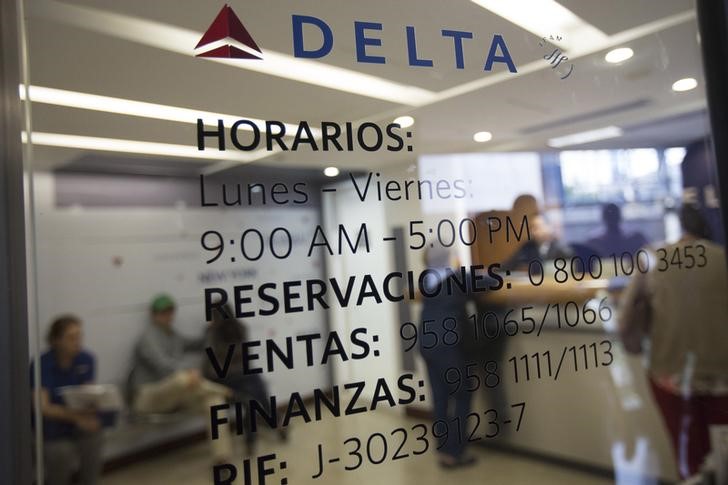By Catherine Ngai and Jeffrey Dastin
NEW YORK (Reuters) - Some major U.S. airlines including Delta and Southwest are rushing to finance losing bets on oil and revamp fuel hedges as tumbling crude prices leave them with billions of dollars in losses, according to people familiar with the hedging schemes.
In theory, airlines are among the top beneficiaries of a six-month slump that halved crude prices to five-year lows. Oil is the biggest variable cost for airlines, often representing a third or more of their total operating expenses.
But now, carriers such as Delta Air Lines and even Southwest Airlines, known for a successful hedging program that locked in cheap fuel prices before they rose a decade ago, see some of the benefits of cheap fuel eaten away by hedging costs.
That is largely because they have used common but risky hedging strategies, among them a "costless collar": selling financial options that pay off when oil prices fall and using the proceeds to buy protection against soaring costs when prices climb, according to three people familiar with the programs.
The two carriers have been moving quickly to strategise how to meet demands from brokers and banks for additional collateral to cover potential losses from a strategy that made perfect sense just six months ago, those people said. The airlines have also held a series of meetings that included airline executives, brokers and consultants, according to the people, who declined to be named because of the sensitive nature of the discussions.
With oil prices tumbling faster and further than anyone had anticipated, the collar hedges left the airlines with insurance against high costs they no longer need and on the hook for protection they sold against a further slide, with potential liabilities on the rise.
Southwest spokesman Chris Mainz said the meetings were part of a routine, although a rapidly changing market called for close attention.
"We continue to benefit from declining fuel prices," Mainz said in an email. "Obviously we're going to move faster when the price drops in the 40 percent range. (Our fuel team) have been very busy actively managing our portfolio to respond to the changes we are seeing in the market."
Delta spokesman Trebor Banstetter said the Atlanta-based carrier was not surprised by the slide, having been prepared to meet its financial obligations if needed.
BOON TO RIVALS
Southwest, Delta and other carriers that sources declined to name, will benefit from the drop in oil prices because they hedge only a portion of the fuel they buy. Southwest, for example, expects to cover only 20 percent of its fuel consumption with hedge contracts this quarter.
Delta expects a $1.7 billion gain from lower fuel prices in 2015, despite $1.2 billion in estimated hedge losses.
Yet rival American Airlines, which has not entered any hedge contracts since late 2013, are set to see a greater boost to their bottom lines.
Industry consultants say hedged airlines have a few choices to deal with the price slide, including selling forward positions on crude oil or jet fuel, changing the prices at which they hedge or selling assets, such as planes.
What airlines exactly plan to do remains unclear, people familiar with the discussions said.
A lack of disclosure requirements makes it almost impossible to tell how or when airlines have hedged, and none would discuss details of their strategies.
Collar transactions looked well suited to the market when prices hovered around $100 per barrel for most of the past four years, allowing airlines to cap their fuel costs at little or no cost, analysts said.
"(Costless) collars are an effective strategy that works best when prices stay within a range," said John Saucer, vice president of research and analysis, at Mobius Risk Group. "But it becomes a very different animal when the market goes against that."
In their October quarterly filings, Southwest and Delta said they used a mix of options and fixed-price swaps.
Southwest also explained that collar trades "carry more risk than purchased call options" because of possibly greater liability when the contracts expire.
The world's biggest low-cost carrier said that a 25 percent decline of crude prices from Sept. 30 would probably force it to pay $615 million in cash collateral, aircraft collateral and letters of credit.
Delta said it would pay $800 million to counterparties if oil fell 20 percent between Oct. 1, 2014 and Dec. 31, 2015. Brent already has tumbled 36 percent since then to trade at about $60 a barrel on Monday.
These hedges weigh on the costs of their future fuel consumption, too.
At current prices, Southwest says it expects to keep only about 80 cents of savings for every $1 in oil price decline, while Delta puts this figure at about 65 cents. American instead will reap the full benefit of cheap fuel.

And every cent counts. Delta has said that one cent change in the price per barrel of oil is worth $40 million to the carrier.
(Reporting by Catherine Ngai and Jeffrey Dastin in New York; Editing by Tomasz Janowski)